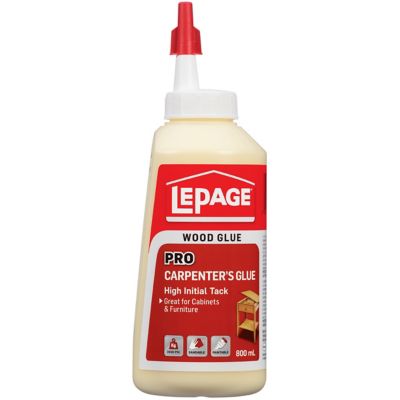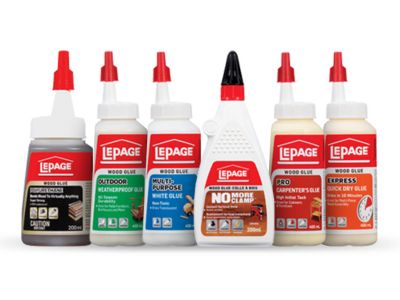Are you curious to know if LePage wood glue is safe to use for food-related applications? Well, you’ve come to the right place! In this article, we’ll explore the question “Is LePage wood glue food safe?” and provide you with all the information you need to make an informed decision. So, let’s dive right in!
When it comes to using wood glue for food-related projects, safety is of utmost importance. Nobody wants to compromise their health or the well-being of others. That’s why it’s crucial to know whether a particular wood glue, like LePage, is suitable for food-related applications. We’ll examine the key factors that determine its safety and address any concerns you may have.
So, if you’re wondering whether you can use LePage wood glue for food-safe projects, stick around! We’re about to lay it all out for you, ensuring you have the knowledge you need to make the right choice. Let’s get started!
Is LePage Wood Glue Food Safe? Exploring its Safety and Uses
Wood glue is a popular adhesive used in various woodworking projects, but when it comes to using it in projects involving food, the question arises: is LePage wood glue food safe? In this article, we will delve into the safety aspects of LePage wood glue and provide you with detailed information to help you make an informed decision.
Understanding the Composition of LePage Wood Glue
LePage wood glue is a type of polyvinyl acetate (PVA) adhesive that is widely used in woodworking due to its strong bond and ease of use. It contains a combination of synthetic polymer emulsion, water, and various additives to enhance its performance. However, it’s important to note that not all wood glues are created equal.
LePage wood glue is designed for bonding porous surfaces, including wood, paper, and fabric. It has a non-toxic formulation once it is completely dry. However, since it is not specifically formulated for food-related applications, it is not classified as food-safe. It is always recommended to use adhesives that are explicitly labeled as food-safe when working on projects involving direct contact with food.
The Risks of Using Non-Food Safe Adhesives
Using non-food safe adhesives such as LePage wood glue in projects involving food can potentially pose health risks. The chemicals used in these adhesives may contain substances that can be harmful if ingested. While the wood glue may be non-toxic once dry, it is not intended for direct contact with consumable items. Therefore, it is crucial to choose adhesives that have been specifically formulated for food-related applications, taking into consideration the potential risks and safety concerns.
Additionally, it is important to note that even with food-safe adhesives, proper application and curing times are essential to ensure the safety of the final product. Always follow the manufacturer’s instructions and allow sufficient time for the adhesive to cure before using the food-related item.
Alternatives to LePage Wood Glue for Food-Safe Projects
When it comes to using adhesives in projects involving food, there are several alternatives to LePage wood glue that are explicitly labeled as food-safe. These adhesives are formulated using ingredients that are approved for direct contact with food and are specifically designed to meet the safety standards required for food-related applications.
One popular option is food-grade silicone adhesive. This type of adhesive forms a strong bond, is resistant to high temperatures, and can be safely used on food-related items. Another alternative is epoxy resin, which is commonly used for creating food-safe coatings and surfaces. It is important to choose an epoxy resin that is explicitly labeled as food-safe to ensure its suitability for your project.
In summary, when it comes to projects involving direct contact with food, it is crucial to prioritize the safety of the final product. While LePage wood glue is a versatile adhesive for woodworking projects, it is not specifically formulated for food-related applications and is not considered food-safe. It is essential to choose adhesives that are explicitly labeled as food-safe and follow the manufacturer’s instructions to ensure the safety and quality of your food-related projects.
Additional Information
Is LePage Wood Glue Toxic?
LePage wood glue is not toxic, but it is important to handle it with care and follow the manufacturer’s instructions for safe usage. Like any adhesive, it should not be ingested and should be kept out of reach of children and pets. When using LePage wood glue, it is recommended to work in a well-ventilated area to minimize exposure to fumes.
Tips for Working with Food-Safe Adhesives
When working on projects involving food and using food-safe adhesives, here are some tips to ensure a successful and safe outcome:
- Choose adhesives that are explicitly labeled as food-safe.
- Read and follow the manufacturer’s instructions carefully.
- Ensure proper curing time for the adhesive.
- Clean surfaces thoroughly before applying the adhesive.
- Use proper safety precautions, such as wearing gloves and working in a well-ventilated area.
- Store adhesives safely, away from children and pets.
- Consider consulting with a professional or expert in food-safe adhesives for specific projects.
Conclusion
When it comes to projects involving food, it is essential to prioritize safety and choose adhesives that are explicitly labeled as food-safe. While LePage wood glue is a reliable adhesive for woodworking projects, it is not classified as food-safe. Opting for food-safe alternatives such as food-grade silicone adhesive or epoxy resin specifically formulated for food-related applications ensures the safety and integrity of your projects. Always follow the manufacturer’s instructions and take the necessary precautions to ensure a successful and safe outcome.
Key Takeaways: Is LePage Wood Glue Food Safe?
- LePage Wood Glue is not considered food safe.
- It is designed for woodworking purposes and not meant to come into direct contact with food or beverages.
- For food-related projects, look for glues that are specifically labeled as food safe.
- Using food-safe glue ensures that there are no harmful chemicals that could contaminate the food.
- Always read the product label or contact the manufacturer to ensure the glue is safe for your intended use.
Frequently Asked Questions
Welcome to our FAQ section where we answer some common questions about the safety of LePage wood glue for food-related purposes.
Can I use LePage wood glue to bond food surfaces together?
No, it is not recommended to use LePage wood glue for bonding food surfaces together. Even though the glue is non-toxic and safe once it dries, it is not formulated or tested for food safety. It’s important to use adhesives that are specifically designed for food-grade applications to ensure the highest level of safety and compliance with food safety regulations.
If you need to bond food surfaces, consider using products that are labeled as food-safe or approved for food-grade applications. These products are formulated to be safe for contact with food and have undergone testing to meet the necessary food safety standards.
Is it safe to use LePage wood glue for crafts involving food, like making decorated cakes?
No, it is not recommended to use LePage wood glue for crafts involving food, such as making decorated cakes. Wood glue is designed for bonding porous surfaces like wood, not for direct contact with food. Even if dried, there can still be residual chemicals from the glue that may transfer to the food, posing a potential health risk.
For food crafts and decorations, it’s best to use edible adhesives or food-safe alternatives like icing, fondant, or edible glue. These products are specifically formulated for safe consumption and ensure that your creations are both visually appealing and safe to eat.
Can I use LePage wood glue on cutting boards and utensils?
No, it is not safe to use LePage wood glue on cutting boards and utensils. Wood glue is not food-safe and can contain chemicals that may pose a risk to human health if ingested. When it comes to items that come into direct contact with food, it is important to use adhesives that are specifically labeled as food-safe.
If you need to repair or bond cutting boards or utensils, consider using food-safe epoxy or adhesives that are specifically formulated for food-grade applications. These products are designed to withstand frequent use and repeated washing, while ensuring that your food stays safe and free from any potentially harmful substances.
Is LePage wood glue safe for use on containers for pantry storage?
No, it is not recommended to use LePage wood glue on containers for pantry storage. Wood glue is not formulated or tested for food safety, and there may be chemicals in the glue that can leach into your food and contaminate it. It’s best to use food-safe adhesives or sealants specifically designed for pantry storage containers.
For pantry storage containers, look for products that are labeled as food-safe, BPA-free, and explicitly designed for food storage. These containers are manufactured with materials that meet the necessary safety standards and are designed to keep your food fresh and uncontaminated.
Can I use LePage wood glue to repair wooden kitchen utensils?
No, it is not advisable to use LePage wood glue to repair wooden kitchen utensils. Wood glue is not designed for direct food contact and may contain chemicals that can be harmful if ingested. When repairing or bonding kitchen utensils, it is important to use adhesives that are specifically labeled as food-safe.
Opt for food-safe adhesives or epoxies that are specially formulated for food-grade applications. These products are specifically designed to withstand the rigors of kitchen use, offer excellent bond strength, and most importantly, ensure your repaired utensils are safe for food contact.
Summary
Lepage wood glue is not recommended for food-related projects, like cutting boards or utensils. It contains chemicals that could be harmful if ingested. However, it is safe for general woodworking projects.
If you’re using Lepage wood glue for non-food items, make sure to follow the instructions and let it dry completely for the best results. Remember, safety always comes first!

